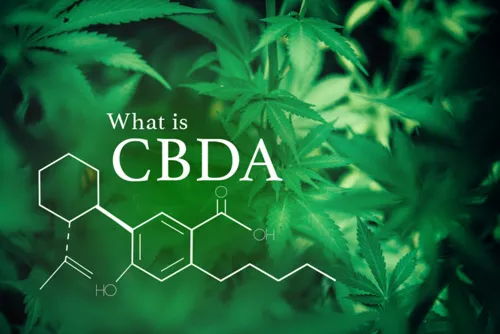CBD has taken the health and wellness industry by storm, with an estimated 1 in 7 adults using a CBD product in the United States. We see CBD almost everywhere now, and it has even made its way into gift bags at prestigious award shows like the Oscars. But what about its precursor CBDA? It is a lesser-known cannabinoid that is filled with benefits, and in many ways is even better than the well-known CBD! Let’s take a look at this minor cannabinoid that has the potential to be used in major ways.
What is CBDA?
First, what exactly is CBDA? CBDA is a minor cannabinoid found in hemp and cannabis plants. CBDA is the precursor to CBD. This means when CBDA is decarboxylated, a process where cannabinoids are exposed to heat, it converts to CBD. This poses a problem for extraction and is part of the reason why it only recently became available in a stable form to infuse into cannabinoid applications. Traditional extraction methods that utilize butane or ethanol in the extraction process need heat for sufficient extraction. This causes a conversion of a majority of the acidic cannabinoids, leaving only trace amounts in the final product. Due to the vast number of benefits CBDA has, global solution providers are finding ways to extract cannabinoids without the use of heat, allowing for the extraction of CBDA at a mass scale.
CBDA is a non-psychoactive cannabinoid, meaning it will bring any euphoria to those who consume. Instead, it helps individual’s feel clearer headed, while reducing anxiety. Though CBDA is less studied compared to other cannabinoids, current and emerging research shows CBDA has the potential to be a therapeutic to help with an array of ailments. Here are some of the many benefits of CBDA:
- Anti-Inflammatory
- Reduces pain and hyperalgesia
- Anti-Seizure
- Anti-Anxiety
- Anti-Depressant
- Reduces nausea and vomiting
How is CBDA better than CBD?
Research has demonstrated that CBDA has many advantages to its neutral counterpart, CBD. Let’s take a deeper dive into why CBDA is better than CBD.
Higher Bioavailability
A study published in the 24th Annual Symposium of the International Cannabinoid Research Society found CBDA is 19x more bioavailable than CBD. Bioavailability is the percentage or fraction of absorption of an administered drug or supplement that reaches the systemic circulation and can have an active effect. CBDA’s superior bioavailability means that when we take an equivalent dose of CBDA and CBD, our bodies are able to absorb more CBDA in comparison. Additionally, it allows for lower doses of CBDA than CBD in a variety of instances, such as reducing seizures in patients with epilepsy. In fact, a patent filed by GW Pharma found CBDA was more effective than CBD at treating seizures and accredited these findings to CBDA’s higher bioavailability. It was also noted that patients would need much lower doses of CBDA than CBD for the same effects. GW Pharma is the maker of Epidiolex, an FDA approved drug with a fixed ratio of plant derived CBD to help patients with various seizure disorders and are hoping to create a therapeutic with CBDA as well.
CBDA has a greater affinity to the body’s serotonin receptor
Through research, CBDA has demonstrated a greater affinity to the body’s 5-HT1A or serotonin receptor than CBD. The serotonin receptor is most recognized for its role in mood support.
However, it is responsible for modulating many critical processes in the body including pain signals, nausea, and the cardiovascular system. CBDA’s greater affinity to the receptor shows it is more powerful than CBD for numerous instances, such as helping those with anxiety and depression, as well as reducing nausea from an array of factors, including chemotherapy induced nausea. The greater affinity also allows for lower doses of CBDA than CBD to feel therapeutic benefits.
Greater Anti-inflammatory effects
Often when we think of inflammation, we associate it with an injury. However, inflammation effects a large majority of people and can occur from everyday activities, such as exercising. Long term inflammation can lead to an array of health problems and can damage muscles and tissues in the body overtime. CBDA is a great cannabinoid to combat inflammation as it inhibits the enzyme COX-2. Inhibiting COX-2 has an anti-inflammatory effect that non-steroidal anti-inflammatory drugs, such as aspirin, also inhibit. Though CBD also have anti-inflammatory effects, CBDA has shown to be more beneficial in numerous studies. In a 2018 study examining CBDA’s anti-inflammatory effects on a rat model with induced acute inflammation, an equivalent dose of CBDA and CBD was given to the model. CBD did not reduce inflammation nor pain, while CBDA did, suggesting CBDA is more beneficial in this instance.
CBD has shined in the spotlight since federal legalization in the 2018 Farm Bill. It helps hundreds of thousands of people maintain their health and wellness. It is time though for the spotlight to shift to its precursor CBDA. CBDA is packed with benefits, and in many ways is better than CBD! If you are looking to gain even more benefits from your cannabinoid routine, adding a product with CBDA is a great place to start.
Always consult with your primary care physician before adding any supplements or wellness products into your routine.

